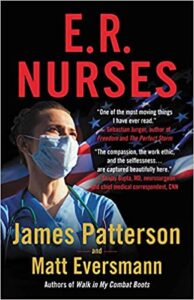 Excerpted from E.R. Nurses: True Stories from America’s Greatest Unsung Heroes, by James Patterson and Matt Everson (get it here), at p. 246:
Excerpted from E.R. Nurses: True Stories from America’s Greatest Unsung Heroes, by James Patterson and Matt Everson (get it here), at p. 246:
“We get a lot of calls to deal with emergency situations in the rural parts of Oklahoma, where a lot of people live off the grid, without TV or running water. They often live together in these compound-type communities, the way cults do. The kids are homeschooled, everyone goes to church, and medical services are provided by someone in the compound. When there’s a bad accident, however, we’re called in.”
House Call #1
“Today, I’m responding to a call involving a fifteen-year-old girl who was riding her ATV, something she’d done a million times on her family’s property.
“I’m inside the helicopter, circling the property, which has Confederate flags and KKK symbols spray-painted in the yard and on the roof. There are swastikas spray-painted on cars, on top of the house (decorated in Christmas lights); someone even went to the trouble of cutting the grass in a certain way so there’s a visible swastika pattern. It’s so big I can see it up here in the air.
“I’m a Black nurse. My pilot, Jackson, is Black, and Eddie, my paramedic, is white and gay and has earrings and pink hair. Jackson looks at me and says, ‘Guys, we can decline.’ He’s concerned for our lives. This is how serious color is in this part of Oklahoma.
“‘I don’t want to do it,’ Jackson goes on. ‘I will not land this helicopter unless you two tell me otherwise.’ I’ve taken care of gunshot victims who have huge swastikas in the middle of their chests or on their foreheads. I’ve kept a lot of white supremacists alive on my watch, but it has always been in a hospital setting. This will be my first time treating someone behind enemy lines.
“‘I don’t give a shit what color they are,’ I say. ‘I got called to do a job, and I’m going to do it. If things go awry once we’re on the ground, then we can abort the mission. But I’m not going to refuse to help someone because of their biases.’
“As Eddie and I reach the compound, lugging our gear, I see a good dozen or more people gathered outside on the porch and on the property. They’re all wearing Confederate flag-emblazoned T-shirts and glaring at me because I’m Black. I look right back at them and smile. That’s right. A Black woman is going to save your daughter’s ass. You will be forever indebted to me. You’re welcome.
“The dad is heavily tattooed and wearing camo pants and a T-shirt with an American flag. He doesn’t look relieved; he looks scared. I don’t know if he’s scared for his daughter or because he’s face-to-face with a Black woman on his property. Maybe it’s a little of both. ‘You the dad?’ I ask. He doesn’t answer. My gaze shifts to the EMT, a white guy dressed in jeans and cowboy boots. His name is Rick, and he’s a volunteer firefighter. We’ve crossed paths before. He knows me and knows my heart. He smirks because we both know that this situation is about to go one of two ways: either the father will let me treat his daughter or the father will get into it with me, and Rick will have to step in and defend me.
“I take charge of the situation. ‘You can put your heart at ease,’ I tell the dad. ‘Between me and this guy standing next to me, you’ve got probably the best nurse and flight medic flying the skies of Oklahoma right now.’ I smile and put my hand on his shoulder. ‘Your daughter is going to be just fine. You’ll be able to come and see her first thing tomorrow.’ I look to the girl. ‘Have you been on a helicopter before?’ ‘No. ‘Let’s go for a ride.’
House Call #2
Her Epilogue
“I have no idea if the experiences these two men had with me changed them in any way.” [I doubt it; attitudes and habits die hard — Ed.] “Quite frankly, it doesn’t matter. I don’t care what color you are. If I’m called to save your life, I’m going to do just that. You can thank me later.”
My Epilogue
I wonder if the girl’s dad and the ex-jailbird still think Black and Gay lives don’t matter? — Ed.